Tuned to Our Temporal Needs

by Fr. Dan Cambra, MIC
Too often in our culture we either over-sentimentalize St. Joseph or overlook him. To set the record straight, in last month's newsletter I announced that we members of the Holy Souls Sodality will celebrate 2019 as our own little Year of St. Joseph. What that means is that we, like many of the great saints, shall endeavor to see St. Joseph for who he was here on earth and the pivotal role he continues to play from Heaven.
I see this as a great spiritual opportunity. This year we shall confidently turn to St. Joseph in prayer not only for the sake of the souls in Purgatory, but living souls as well, including ourselves. We shall turn to him for both spiritual and temporal needs. Indeed, in St. Joseph, the spiritual and temporal ultimately and intimately intertwine.
It's true St. Joseph stands as a rather elusive figure in Scripture. Indeed, we don't know a lot about him, but what we do know is quite profound. A carpenter by trade, a man of modest means, he was chosen by God to be head of the household for the Holy Family. We can assume that Sts. Joachim and Ann, the parents of the Blessed Virgin Mary, accepted him as Mary's suitor, recognizing in him a man capable of providing for their daughter's needs and clearly disposed to doing God's will in his life.
With the Annunciation — that Mary would conceive the Son of God — St. Joseph's role grew exponentially more complicated. Recall, that when he learned Mary was pregnant, he resolved to divorce her quietly. But when the angel explained that Mary had conceived the Child through the Holy Spirit and that this Child would save His people from their sins (see Mt 1:18-25), Joseph was quick to take her as his wife.
He was going to walk away. But he didn't. This humble carpenter became husband of the Mother of God, foster father of Jesus, provider for — and watchful defender of — the Holy Family. In doing so, he fulfilled an essential position in the plan of our salvation. This is why, after Jesus and Mary, St. Joseph is the most highly honored and influential member of the human race.
It's no wonder then that devotion to St. Joseph stands as a thoroughly practical endeavor. I like to think of him as our "handyman in Heaven."
Saint Teresa of Avila, the first woman Doctor of the Church, saw him similarly. She measured his greatness in terms of the tasks he undertakes as intercessor. Indeed, she attributed her miraculous cure from paralysis to him. She wrote:
I wish I could persuade everyone to be devoted to this glorious saint, for I have great experience of the blessings which he can obtain from God. I have never known anyone to be truly devoted to him and render him particular services who did not notably advance in virtue, for he gives very real help to souls who commend themselves to him.
It was St. Teresa whom God tasked to reform the Carmelite Order. While she was in prayer, Christ told her that St. Joseph was to serve as namesake and patron for the first reformed monastery she was to establish.
Saint Joseph played a conspicuous role in the life of St. Faustina as well. Her devotion to St. Joseph no doubt was fostered through her choice of spiritual congregations. The Sisters of Our Lady of Mercy prayed daily to St. Joseph, and St. Joseph served as the namesake for the congregation's mother house in Cracow-Lagiewniki, where St. Faustina lived as a novice, professed her first and perpetual vows, served as cook, gardener, and doorkeeper, and spent the last years of her earthly life.
Still, St. Faustina could rightly claim a relationship with St. Joseph far beyond that of her fellow religious sisters. In her Diary, entry 1203, we learn four important things:
• that St. Joseph urged her "to have a constant devotion to him";
• that he wanted her to recite the Our Father, Hail Mary, Glory be, and the Memorare once every day;
• that he was supporting her work to make Christ's mercy known to the world; and
• that he promised her special help and protection.
Since their founding, the Little Sisters of the Poor, too, place their temporal needs into the hands of faithful St. Joseph. The sisters share stories of miracles through his intercession. One of their convents in the United States was once running out of coal, so the sisters placed a lump of coal in front of a St. Joseph statue. Before the day was done, two carloads of coal were donated to the convent. On another occasion, when they lacked stockings, the sisters strung a pair around a statue of St. Joseph. It only took a few hours for a large box of stockings to arrive at their doorstep. The miracles through St. Joseph continue to this day.
The point I wish to underscore here is that God understands that our temporal necessities can put us in spiritual danger.
Scarcity can cause distractions. God doesn't want a wedge to develop between us and Him. He doesn't want us single-mindedly worrying about the basic provisions for life: food, shelter, clothing, etc. He wants us to pursue holiness.
We must work hard — yes — just as St. Joseph surely did. We must provide for ourselves and for our families. But if and when we find ourselves in temporal need, God gives us the solution: "Ask and it will be given to you; seek and you will find; knock and the door will be opened to you" (Mt 7:7). The Church gives us the intercession of the saints, the most powerful among them (next to Mary) being St. Joseph, patron of the universal Church, who exemplified how our life on earth serves as prelude to our eternal life.
Think about it:
God the Father turned to St. Joseph for help.
Mary, the Mother of God, turned to St. Joseph for help.
Scores of great saints throughout history, including Faustina and Teresa of Avila, turned to St. Joseph for help.
He disappoints no one.
We all need help from Heaven. Saint Joseph, the tender-hearted carpenter, father, husband, and friend, awaits our prayers. Let us present our needs to him.
